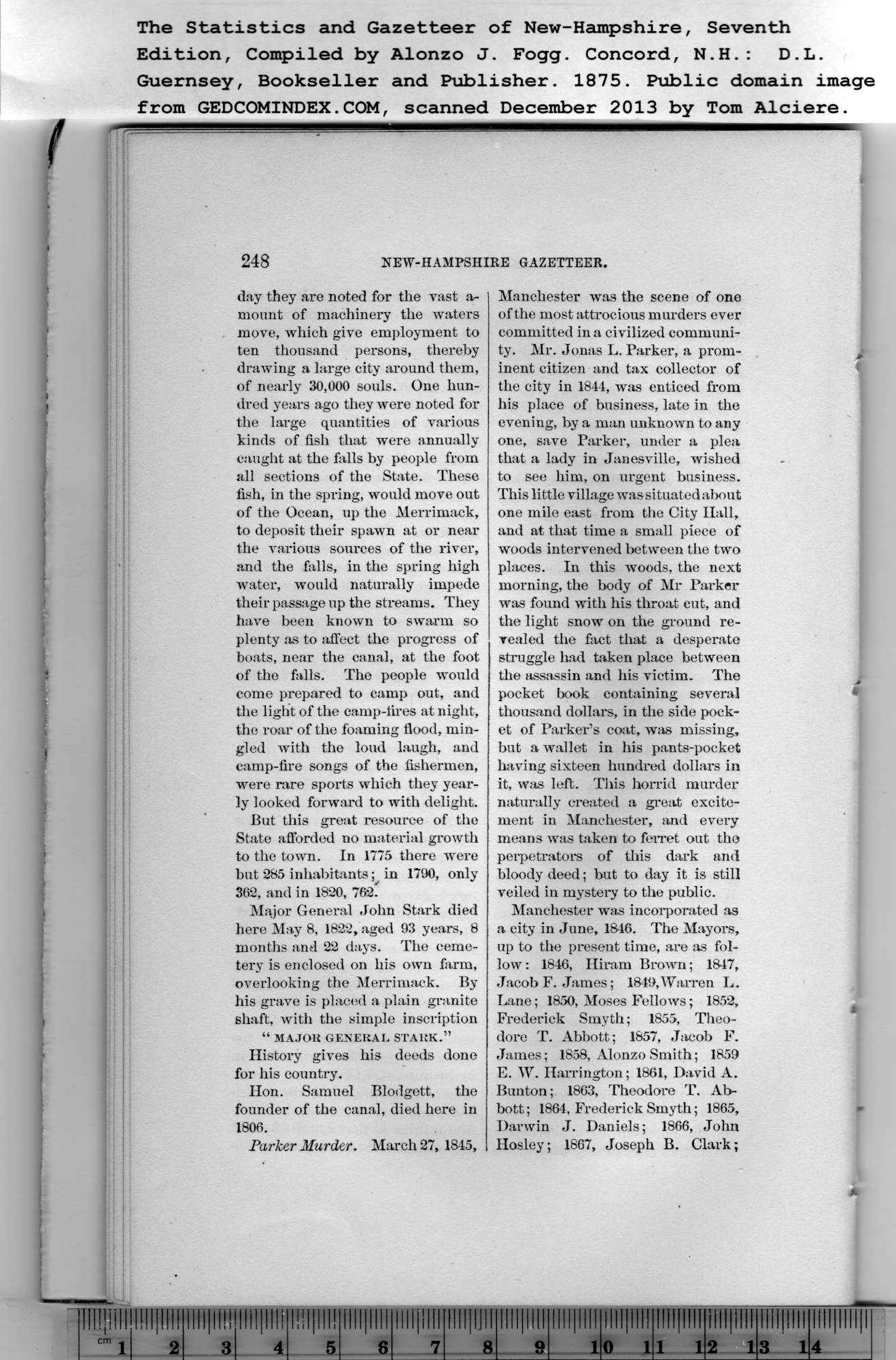|
248
The Statistics and Gazetteer of New-Hampshire, Seventh
Edition, Compiled by Alonzo J. Fogg. Concord, N.H.: D.L.
day they are noted for the vast a-
mount of machinery the waters
move, which give employment to
ten thousand persons, thereby
drawing a large city around them,
of nearly 30,000 souls. One hun-
dred years ago they were noted for
the large quantities of various
kinds of fish that were annually
caught at the falls by people from
all sections of the State. These
fish, in the spring, would move out
of the Ocean, up the Merrimack,
to deposit their spawn at or near
the various sources of the river,
and the falls, in the spring high
water, would naturally impede
their passage up the streams. They
have been known to swarm so
plenty as to affect the progress of
boats, near the canal, at the foot
of the falls. The people would
come prepared to camp out, and
the light of the camp-fires at night,
the roar of the foaming flood, min-
gled with the loud laugh, and
camp-fire songs of the fishermen,
were rare sports which they year-
ly looked forward to with delight.
But this great resource of the
State afforded no material growth
to the town. In 1775 there were
but 285 inhabitants; in 1790, only
362, and in 1820, 762.
Major General John Stark died
here May 8, 1822, aged 93 years, 8
months and 22 days. The ceme-
tery is enclosed on his own farm,
overlooking the Merrimack. By
his grave is placed a plain granite
shaft, with the simple inscription
“ MAJOK GENERAL STARK.”
History gives his deeds done
for his country.
Hon. Samuel Blodgett, the
founder of the canal, died here in
1806.
Parker Murder. March 27, 1845, |
Manchester was the scene of one
of the most attrocious murders ever
committed in a civilized communi-
ty. Mr. Jonas L. Parker, a prom-
inent citizen and tax collector of
the city in 1844, was enticed from
his place of business, late in the
evening, by a man unknown to any
one, save Parker, under a plea
that a lady in Janesville, wished
to see him, on urgent business.
This little village was situated about
one mile east from the City Hall,
and at that time a small piece of
woods intervened between the two
places. In this woods, the next
morning, the body of Mr Parker
was found with his throat cut, and
the light snow on the ground re-
vealed the fact that a desperate
struggle had taken place between
the assassin and his victim. The
pocket book containing several
thousand dollars, in the side pock-
et of Parker’s coat, was missing,
but a wallet in his pants-pocket
having sixteen hundred dollars in
it, was left. This horrid murder
naturally created a great excite-
ment in Manchester, and every
means was taken to ferret out the
perpetrators of this dark and
bloody deed; but to day it is still
veiled in mystery to the public.
Manchester was incorporated as
a city in June, 1846. The Mayors,
up to the present time, are as fol-
low: 1846, Hiram Brown; 1847,
Jacob F. James; 1849,Warren L.
Lane; 1850, Moses Fellows; 1852,
Frederick Smyth; 1855, Theo-
dore T. Abbott; 1857, Jacob F.
James; 1858, Alonzo Smith; 1859
E. W. Harrington; 1861, David A.
Bunton; 1863, Theodore T. Ab-
bott ; 1864, Frederick Smyth; 1865,
Darwin J. Daniels; 1866, John
Hosley; 1867, Joseph B. Clark; |
